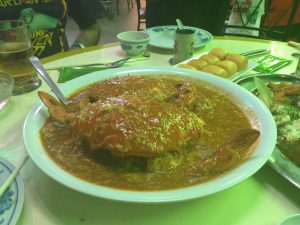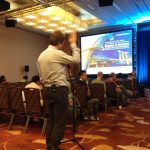Genetics and open access publishing meets Chilli Crab
 Singapore – a wonderful city of diverse cultures and culinary affair, is not just about the infamous chilli crab or signature cocktail, Singapore Sling, but from the 13-19 April the vibrant country plays host to one of the largest meetings in genetics and genomics. The 2013 Human Genome Meeting/International Congress of Genetics (HGM/ICG) meeting is the first of its kind in Asia – bringing together a genetics congress that has been held every five years since 1899 with the young upstart genomics experts from HUGO (the Human Genome Organisation), the 2013 meeting brought together over 1000 scientists from around the world at the Marina Bay Sands Convention Centre (a favourite location of ours since last years Bio-IT World Asia meeting).
Singapore – a wonderful city of diverse cultures and culinary affair, is not just about the infamous chilli crab or signature cocktail, Singapore Sling, but from the 13-19 April the vibrant country plays host to one of the largest meetings in genetics and genomics. The 2013 Human Genome Meeting/International Congress of Genetics (HGM/ICG) meeting is the first of its kind in Asia – bringing together a genetics congress that has been held every five years since 1899 with the young upstart genomics experts from HUGO (the Human Genome Organisation), the 2013 meeting brought together over 1000 scientists from around the world at the Marina Bay Sands Convention Centre (a favourite location of ours since last years Bio-IT World Asia meeting).
 Gigascience‘s Executive Editor, Scott Edmunds, and Commissioning Editor, Nicole Nogoy, attended the diverse meeting to learn the latest in the genetics and genomics world. Although having a heavy human focus, the meeting covered a wide range of topics from plant, animal and medical applications, as well as database and privacy. With a fantastic line-up spanning big science (workshops and talks from ENCODE and Ewan Birney, pictured) to monogenic gene-disorders, many of our editorial board were present, and our BGI colleagues also hosted a workshop.
Gigascience‘s Executive Editor, Scott Edmunds, and Commissioning Editor, Nicole Nogoy, attended the diverse meeting to learn the latest in the genetics and genomics world. Although having a heavy human focus, the meeting covered a wide range of topics from plant, animal and medical applications, as well as database and privacy. With a fantastic line-up spanning big science (workshops and talks from ENCODE and Ewan Birney, pictured) to monogenic gene-disorders, many of our editorial board were present, and our BGI colleagues also hosted a workshop.
A few highlights this week included Patrick Tan’s (from the Genome Institute of Singapore) presentation from a study of Aristolochia plants; these plants produce aristolochic acid (AA) – and is found in many Chinese medicine and herbal supplements commonly used to treat a variety of ailments from arthritis to menstrual cramps. AA is highly mutagenic and has been shown to cause mutations leading to kidney and urinary tract cancers. An increasing global burden in AA-related urinary tract cancers in China and Taiwan, as well as outbreaks in the USA and Europe, sparked Tan’s interest to study its potential relationship in other cancer types, and it was nice to see him re-analyse data produced by the Asian Cancer Research Group (ACRG) that is hosted in our GigaDB database.
Dennis Lo from the Chinese University of Hong Kong presented his pioneering work in the field of non-invasive pre-implantation genetic diagnosis of trisomy 21, 13 and 18. His latest work focuses on twin pregnancies which present a new challenge due to mono- or dizygocity. They applied a targeting sequencing approach and found differences in allele expression between mono and dizygotic twins, useful in determining zygosity and noninvasive testing for genetic disorders.
Michael Hayden of the Translational Medicine Lab at A*STAR gave an interesting presentation on how genetics is helping drug discovery. His group are particularly interested in ‘black swan‘ events – events that are completely unexpected and have extreme impact. Hayden emphasised we no longer have a sequencing issue, but a phenotype issue. He gave several nice examples of how target validation is tightly linked to a phenotype which led to drug discovery and clinical translation/treatment. An example ‘black swan’ event was his work on sclerosteosis – an opposite phenotype to osteoporosis consisting of increased bone density; their analyses lead to the creation of a humanized monoclonal antibody to inhibit sclerostin for osteoporosis.
Mike Snyder (Stanford) gave an update on his “Synderome” personal genome work, iPOP (integrated personal omics profiling), and highlighted their genome phasing approach. Being a big fan of crowdsourcing and community annotation approaches (see our OpenAshDB and “peoples parrot” papers) – there is currently 50Tb of Snyder’s own data consisting of genomic (blood, saliva and maternal), transcriptome and protein array, as well as proteomic and metabolomic data, all available from his website: snyderome.standford.edu. Peer Bork also presented his my.microbes project to catalog, share and compare microbiomes between interested parties. His concept of people with specific microbiota enterotypes using social networks to discuss which brand of yoghurts are best for stomach upsets shows how important genomic advances are increasingly becoming part of our every day lives.
Nicole Nogoy, Commissioning Editor, GigaScience
Promoting open access publishing in Singapore
Tomorrow morning, GigaScience will be participating in an Open Access workshop held at A*Star’s Fusionopolis kindly organised by Kostas Repanas, in a bid to promote open access publishing and data sharing in Singapore. In addition to GigaScience, there will be presentations from BioMed Central, Springer Open, and Wiley Open Access, and if you are at A*STAR or in Singapore see the program below and please drop by:
Date: Thursday 18th April
Time: 9:00-12:00
Venue: Infuse, Level 14, Connexis South Tower, Fusionopolis
1 Fusionopolis Way
A*STAR Open Access (OA) Workshop
9:00-9:20 Coffee/Tea
9:20-9:30 Opening remarks by Sir David Lane, A*STAR Chief Scientist
9:30-10:00 OA, open-data, open-source and open-review: GigaScience, and how licensing can change the way we do research
Dr Scott Edmunds, Executive Editor, GigaScience journal
Dr Nicole Nogoy, Commissioning Editor, GigaScience journal
10:00-10:30 OA and the future of publishing
Mr Robert Long, Vice President and Sales Director, Asia Pacific, Wiley
Mr Anthony Lau, Vice President, International Development, Asia, Wiley
10:30-10:50 Tea break
10:50- 11:10 OA publishing at BioMed Central: a pioneer’s perspective
Dr Nandita Quaderi, Publisher, BioMed Central
Dr Rebecca Furlong, Editor, Genome Medicine
11:10-11:30 OA repositories and Self-Archiving / SpringerOpen Journals
Mr Leo Cheung, Open Access Publishing Manager, BioMed Central
Mr Bin Walters, SpringerOpen Journal Manager, Springer Asia
11:30-12:00 Open discussion/debate
Update 20/04/13: here are the slides from our talk: